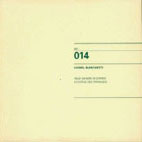 Much moreoffensively bad than the M. Behrens' disc, the pastiche of music thatis not even Marchetti's own is pretentious in concept and anunenjoyable listen. Though I understand the irony of using the tool ofan audio collage, which is an important part of the history ofexperimental music, and comprising this collage partially ofexperimental music itself, I find very little value in the year 2002 bylistening to this sort of experiment - if it were created 40 years ago,perhaps, but not today. The disc's pretentiousness is increased bymaking the 9-second silences between pieces their own indexed trackswith titles like "Silence Simple" and "Silence du Chaman Blanc."Marchetti writes, "For a while, I have been reading 'Shamanism andArchaic States of Ecstasy'...in which I found descriptions ofrituals...these were not far from a place of spirit that I have wantedto share. The composition is able to make the listener live with mymythology, more aware of the world's potential forces." I understandMarchetti's wanting to convey his own world to the listener, but bylistening to musics that aren't his own, I don't feel enlightened byMarchetti's world, nor do I feel like I want to be.
Much moreoffensively bad than the M. Behrens' disc, the pastiche of music thatis not even Marchetti's own is pretentious in concept and anunenjoyable listen. Though I understand the irony of using the tool ofan audio collage, which is an important part of the history ofexperimental music, and comprising this collage partially ofexperimental music itself, I find very little value in the year 2002 bylistening to this sort of experiment - if it were created 40 years ago,perhaps, but not today. The disc's pretentiousness is increased bymaking the 9-second silences between pieces their own indexed trackswith titles like "Silence Simple" and "Silence du Chaman Blanc."Marchetti writes, "For a while, I have been reading 'Shamanism andArchaic States of Ecstasy'...in which I found descriptions ofrituals...these were not far from a place of spirit that I have wantedto share. The composition is able to make the listener live with mymythology, more aware of the world's potential forces." I understandMarchetti's wanting to convey his own world to the listener, but bylistening to musics that aren't his own, I don't feel enlightened byMarchetti's world, nor do I feel like I want to be. The M. Behrens disc is less pretentious than Marchetti's, but stillvery self-absorbed. The pieces, which follow some sort of World War IIera technology battle theme, are comprised wholly of Behrens' olderworks that he's re-evaluated and re-processed for this project. Theextensive, personal liner notes by Behrens explain a good deal aboutthe processes used to create these pieces and the concepts which he'sintertwined within them - mostly coming from a book called "The SecretWar." But since most listeners haven't read this book, and a good dealof listeners don't know the early M. Behrens pieces that he's samplingfrom, the concepts and processes become much less important to thelistener than they are to the artist. The music itself is less annoyingto listen to than Marchetti's collage, but on its own it's not verygripping, and its unclear how it fits in with his elaborate concept. Alarge part of the disc is so quiet that it requires serious attentionand concentration for long stretches of time. When sounds finally dorise to a normal level, they're not interesting enough to be worth theeffort. Intransitive should be commended for releasing conceptual workslike these, and much of the rest of the Intransitive catalog is quiteinteresting, but these two discs are too entrenched in the artists'personal worlds to be very interesting, even to a listener who'swilling to give them a try. -
The M. Behrens disc is less pretentious than Marchetti's, but stillvery self-absorbed. The pieces, which follow some sort of World War IIera technology battle theme, are comprised wholly of Behrens' olderworks that he's re-evaluated and re-processed for this project. Theextensive, personal liner notes by Behrens explain a good deal aboutthe processes used to create these pieces and the concepts which he'sintertwined within them - mostly coming from a book called "The SecretWar." But since most listeners haven't read this book, and a good dealof listeners don't know the early M. Behrens pieces that he's samplingfrom, the concepts and processes become much less important to thelistener than they are to the artist. The music itself is less annoyingto listen to than Marchetti's collage, but on its own it's not verygripping, and its unclear how it fits in with his elaborate concept. Alarge part of the disc is so quiet that it requires serious attentionand concentration for long stretches of time. When sounds finally dorise to a normal level, they're not interesting enough to be worth theeffort. Intransitive should be commended for releasing conceptual workslike these, and much of the rest of the Intransitive catalog is quiteinteresting, but these two discs are too entrenched in the artists'personal worlds to be very interesting, even to a listener who'swilling to give them a try. - samples:
- M. Brehens - 1939
- M. Brehens - 1941
- M. Brehens - 1943
- Lionel Marchetti - Cinq
- Lionel Marchetti - Sept
- Lionel Marchetti - Un
Read More

